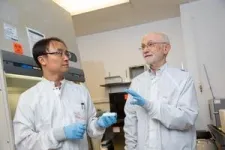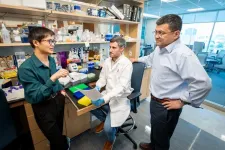(Press-News.org) People who primarily use their own gut feeling to determine what is true and false are more likely to believe conspiracy theories. That is the conclusion of researchers at Linköping University, Sweden, who have investigated the relationship between susceptibility to misleading information and the conviction that the truth is relative.
“I think many people who emphasise a more relativistic view of what truth is mean well. They believe that it’s important that everyone should be able to make their voice heard. But these results show that such a view can actually be quite dangerous,” says PhD student Julia Aspernäs at the Department of Behavioural Sciences and Learning in Linköping.
In two studies reported in an article in the Journal of Research in Personality, she and two colleagues have investigated the relationship between so-called truth relativism and the risk of falling victim to incorrect or fraudulent information.
The first study involves approximately one thousand Swedes. In an online survey, participants were asked to answer questions about their views on what truth is. They then had to take a position on various conspiracy theories and also assess the content of a number of nonsense sentences.
The researchers also collected information on factors previously found to be related to belief in misleading information, such as the ability to reason analytically, political orientation, age, gender and educational level.
In the second study, more than 400 people from the UK participated. Here the number of questions was expanded and the participants’ degree of dogmatism and willingness to adapt their perceptions when faced with new facts were also measured.
From the material, the researchers unearthed two types of truth relativism. One that comprises those who are convinced that what you personally feel to be true is true, that is to say, that truth is subjective. And one including those who believe that truth depends on which culture or group you belong to, so-called cultural relativism.
The results clearly show that those who believe that the truth is subjective are more likely to believe conspiracy theories and to hold on to their beliefs even when faced with facts that contradict them. They also have a greater tendency to find profound messages in nonsense sentences.
Even when the researchers investigated other possible explanations, such as the ability for analytical thinking or political orientation, subjectivism remained as an independent, explanatory factor.
The connections were not as clear for those who believe that truth is culture-bound and the results there point partly in different directions.
To the researchers’ surprise, the data collection from the UK also showed a link between subjectivism and dogmatism. Thus, someone who claims that the truth is personal can, paradoxically, often at the same time reject other people’s right to their own truth.
Julia Aspernäs thinks that the results are useful when listening to political debates, such as those concerning schooling. People may have different opinions on matters of fact, but behind this may lie a fundamental disagreement about how the world works and what even exists.
“I got the idea when listening to debates about whether students should learn factual knowledge or be encouraged to themselves seek out what they think is true. It sounded like the debaters had completely opposite assumptions about what truth is and argued that their own approach was the best way to help students become critical thinkers. Although our study did not investigate causality, we see that truth relativism seems to be linked to a greater belief in misleading information. It may be important to keep that in mind,” she says.
The research has been financed by the Swedish Research Council.
END
They fall more easily for conspiracy theories
2023-09-07
ELSE PRESS RELEASES FROM THIS DATE:
Almoosa Specialist Hospital is first to be certified as a Comprehensive Chest Pain Center in the Kingdom of Saudi Arabia
2023-09-07
DALLAS and Al Mubarraz, Kingdom of Saudi Arabia, September 7, 2023 — Almoosa Specialist Hospital, in Al Ahsa, Saudi Arabia has been recognized by the American Heart Association, the world's leading nonprofit organization focused on heart and brain health for all, as a the first Comprehensive Chest Pain Center in the country. This designation signifies the hospital’s status as a critical element in the kingdom’s effort to create a system of healthcare that seeks to save lives in Saudi Arabia by closing the gaps ...
Psilocybin – a promising therapy for treatment-resistant depression?
2023-09-07
September 7, 2023 – A growing body of evidence suggests that psychedelic drugs may be useful in treating various mental health conditions. However, many challenges remain in defining their clinical benefits and overcoming the complex regulatory obstacles to their use. The September issue of Journal of Psychiatric Practice presents a research review and update on therapeutic use of psychedelics – focusing on the use of psilocybin for treatment of depression. The journal is published in ...
NASA’s Swift learns a new trick, spots a snacking black hole
2023-09-07
Using NASA’s Neil Gehrels Swift Observatory, which launched in 2004, scientists have discovered a black hole in a distant galaxy repeatedly nibbling on a Sun-like star. The object heralds a new era of Swift science made possible by a novel method for analyzing data from the satellite’s X-ray Telescope (XRT).
“Swift’s hardware, software, and the skills of its international team have enabled it to adapt to new areas of astrophysics over its lifetime,” said Phil Evans, an astrophysicist at the University of Leicester in the United Kingdom and longtime Swift team member. “Neil Gehrels, the ...
U of M study suggests hepatitis C patients should consider revaccination for hepatitis B
2023-09-07
MINNEAPOLIS/ST. PAUL (09/07/2023) — Recently published research from the University of Minnesota Medical School suggests individuals with hepatitis C should consider revaccination for hepatitis B. The study was published in the Journal of Infectious Diseases.
Previous research has shown individuals with hepatitis C infection have a lower response to the hepatitis B virus (HBV) vaccine.
“This study has broad implications for public health in hepatitis-infected individuals,” said Jose Debes, MD, PhD, an ...
NYU Tandon School of Engineering researchers develop hurricane power outage prediction model that outperforms traditional methods
2023-09-07
Utility companies are generally well-equipped to handle routine blackouts, but often struggle with extreme weather events like hurricanes.
Conventional hurricane power-outage prediction models often produce incomplete or incorrect results, hampering companies’ abilities to prepare to restore power as quickly as possible, especially in cities that are susceptible to prolonged hurricane-induced power outages.
New research from NYU Tandon School of Engineering may help solve that problem.
By combining wind speed and precipitation ...
Cattle on low-protein rations may need amino acid supplement to boost milk yield
2023-09-07
UNIVERSITY PARK, Pa. — When dairy cows are fed diets with reduced protein concentrations — aimed at decreased environmental nitrogen pollution from their manure such as nitrate leaching, nutrient-laden run-off and ammonia volatilization — their milk production can suffer. Supplementing the amino acid histidine may help in maintaining, and even increasing, milk and milk-protein yields.
That’s the conclusion of a new study conducted by an international research team led by Alexander Hristov, Penn State distinguished ...
"Monstrous births” and the making of race in the nineteenth-century United States
2023-09-07
From the Middle Ages to the Enlightenment, “monstrous births”—malformed or anomalous fetuses—were, to Western medicine, an object of superstition. In 19th-century America, they became instead an object of the “modern scientific study of monstrosity,” a field formalized by French scientist Isidore Geoffroy Saint-Hilaire. This clinical turn was positioned against the backdrop of social, political, and economic activity that codified laws governing slavery, citizenship, immigration, family, ...
Moral reasoning displays characteristic patterns in the brain
2023-09-07
(Santa Barbara, Calif.) — Every day we encounter circumstances we consider wrong: a starving child, a corrupt politician, an unfaithful partner, a fraudulent scientist. These examples highlight several moral issues, including matters of care, fairness and betrayal. But does anything unite them all?
Philosophers, psychologists and neuroscientists have passionately argued whether moral judgments share something distinctive that separates them from non-moral matters. Moral monists claim that morality is unified by a common characteristic and that all moral issues involve concerns about harm. Pluralists, in contrast, argue that moral ...
Echoes of extinctions: novel method unearths disruptions in mammal trait-environment relationships
2023-09-07
Large-bodied mammals play crucial roles in ecosystems. They create habitats, serve as prey, help plants thrive, and even influence how wildfires burn. But now, fewer than half of the large mammal species that were alive 50,000 years ago exist today, and those that remain are threatened with extinction from intensifying climate change and human activities.
While mammal extinctions are well-documented, very little research has explored the impact those losses had on the nuanced ways in which mammal communities interact with their environments. Researchers at the Georgia Institute of Technology are using a novel methodology to investigate how mammals’ ability to function in their environments ...
Specialized T cells in the brain slow progression of Alzheimer’s disease
2023-09-07
(MEMPHIS, Tenn. – September 07, 2023) As many as 5.8 million Americans are currently living with Alzheimer’s disease, a neurodegenerative condition associated with progressive cognitive decline, including loss of memory capabilities . Protein aggregates, composed of beta-amyloid or other proteins, form in the brains of individuals with Alzheimer’s. These beta-amyloid plaques appear to be a significant contributor to the disease. St. Jude Children’s Research Hospital scientists uncovered a subset of immune cells that appears to slow this beta-amyloid plaque accumulation ...






